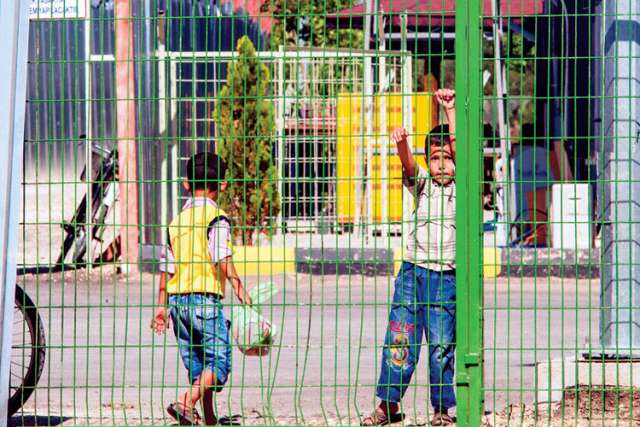The Sponsorship Agreement Holders’ Association, consisting mainly of church-based organizations who have been sponsoring refugees since Canada brought 60,000 Vietnamese boat people into the country in 1980, reports its members were able to submit 62 applications for sponsorship in 2013. In the first half of 2014, 83 applications have been submitted. The in-Canada processing of applications can take six to eight months. Security checks, medical exams and interviews by Canadian staff in overseas visa posts take two to three years on average.
Of last year’s 62 private sponsorship applications for Syrian refugees, the Office of Refugees Archdiocese of Toronto submitted about 40, said ORAT director Martin Mark.
The government has been more successful bringing some of its own 200 government-sponsored refugees to Canada.
Citizenship and Immigration Minister Chris Alexander and his communications staff refuse to answer questions about how many Syrian refugees have made it to Canada. Alexander and his staff instead claim “1,150 have received Canada’s protection and are inside Canada.” Most were in Canada when the civil war broke out in 2012 and asked permission to stay.
Sponsorship Agreement Holders have been slow to take up the invitation to sponsor Syrians because the idea was sprung on them as a surprise July 1, 2013, said council member Alexandra Kotyk. Agencies learned the government was committing them to take in 1,100 Syrian refugees from media reports.
Consultation between the government and refugee-sponsoring organizations has not picked up since, according to Kotyk.
“We have never spoken with Chris Alexander on this,” she said. “We speak with people at a different level in government on this and they are not the people who are able to make the decisions that need to be made.”
By making almost its entire Syrian commitment dependent on private sponsorship, CIC set up unrealistic expectations.
“We knew our program wasn’t going to be able to help right away,” Kotyk said.
The contrast between how Canada approached private sponsorship for Iraqi refugees in 2009 and how it has dealt with Syrian sponsorships over the last year is stark, said ORAT’s Mark. There were extensive consultations both before and after Canada announced it would bring in 20,000 Iraqis by the end of 2014.
A high level engagement with Church and community leaders primed the pump for both donations and volunteers to support sponsorship of Iraqis, said Mark.
“There could never have been annually 2,500 Iraqi sponsorships submitted without the Cardinal (Thomas Collins), without the CCCB, without bishops, without other community leaders asking people for support,” he said.
Not only have sponsoring agencies had less time to ramp up a campaign and organize parishes to prepare for another wave of families from the Middle East, increased cost and constantly changing CIC rules are making the task harder, said Mark.
“It’s slow and overwhelming,” Mark told The Catholic Register. “I am running from meeting to meeting to explain again and again the same things — how you can sponsor, what is the commitment, what is the new criteria. Immigration Canada changes the process all the time.”
The liability commitment for sponsors, cancellation of most health insurance for refugees and launching and tracking sponsorship applications have all driven up the cost of bringing refugees to Canada.
For many Sponsorship Agreement Holders Syria presents new challenges, said Kotyk.
“The issue is that because it’s a population most of us haven’t been connected with before, trying to fit them into the way we do sponsorship can be very difficult. And so it’s frustrating because we want to help, we know there’s need out there,” she said. “There hasn’t been a flood of interest from Syrian families in Canada asking us to do cases. The ones who have been asking us to do cases don’t have the financial ability to help us cover the costs.”
Sponsorship Agreement Holders are also leery about how the Syrian program may affect their efforts to sponsor refugees from other parts of the world. Last October Citizenship and Immigration Canada told Sponsorship Agreement Holders they would soon be given their annual quota for 2014 — the number of refugees each holder is allowed to sponsor from each region of the world. In March the CIC told The Catholic Register it would release those numbers “soon.” As of June 20, the 2014 quotas have not been released.
At a United Nations meeting in Geneva in July, Canada is expected to make a new commitment to resettle Syrian refugees. United Nations High Commissioner for Refugees Antonio Guterres has asked resettlement countries to take in 100,000 more Syrians. Given that Canada traditionally takes in one out of every 10 refugees who are resettled, Church and refugee organizations are calling for Canada to commit to 10,000 Syrians.
But that commitment will be meaningless if it means Canada then reduces the number of refugees it takes from the rest of the world, said Mark.
“If it comes at a price of cutting back settlement from other parts of the world, it would be wrong,” Mark said.
“We don’t want to say, let’s stop the Somalis and the Afghanis and the Congolese as the price of having the Syrians here.”
Given that the total number of refugees resettled in Canada has been on a downward trend, there is extra capacity to accept Syrians in addition to other refugees, Mark said.
The eight-month delay in receiving quota numbers from CIC is playing havoc with sponsorship plans. Agencies such as ORAT with willing sponsors ready cannot submit new applications until they receive their quota.
“It shows disrespect. It also shows, generally, that the government is not fully comprehending its responsibilities and duties,” said Mark. “All the government has to do is announce quota... How can we maintain the enthusiasm of people to help us in this program? It is not fair.”
Citizenship and Immigration communications staff refused to answer written questions and did not return phone calls.


